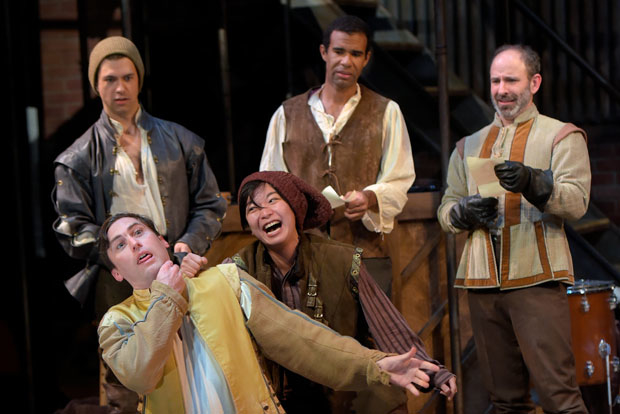Shakespeare in Love
The Marin Theatre Company brings an adaptation of the Academy Award-winning film to the stage.

(© Kevin Berne Image)
Some people think his collected work rivals the Bible as the world’s most powerful literature. Others think he’s a complete fraud. Either way, William Shakespeare has become a work of fiction, a superhero or a super-villain whose life has inspired flights of fancy like the musical Something Rotten!, or Bill Cain’s dark and serious play Equivocation, or even the short-lived teen angst TV series Will.
Perhaps the most celebrated of these Shakespearean fancies is Shakespeare in Love, the 1998 Academy Award winner for best film, which imagined a struggling young writer named Will finding his muse in a regal young woman, Viola, who has disguised herself as a man so she may defy the laws of late 16th-century London and explore her theatrical passions as an actor.
With an Oscar-winning screenplay by preeminent playwright Tom Stoppard (with Marc Norman), it seems only natural that a stage adaptation would eventually appear. What is surprising is that the play adaptation feels like it had aspirations to be a musical, with adapter Lee Hall (Billy Elliott) wrestling it into a lumpy play with lots of music and retaining only some of the charm of the movie.
Director Jasson Minadakis goes for a stripped-down theater vibe with Shakespeare in Love at the Marin Theatre Company, with 13 actors playing around 30 roles and having them provide all of the musical accompaniment for Paddy Cunneen’s overactive score. That makes for a frenetic two-plus hours that offer only intermittent pleasures.
Minadakis’s production only comes into focus in Act 2, when the love story between Will and Viola blossoms and begins to turn Will’s latest play, Romeo and Ethel, the Pirate’s Daughter, into a more familiar tragedy of star-crossed lovers. Adam Magill is earnest and endearing as Will, but it’s Megan Trout as Viola who brings the passion, not just for Will but for the craft of acting and the whole enterprise of theater-making. Watching Viola watch The Two Gentlemen of Verona as she mouths the dialogue along with the actors is to experience the drama of a constrained person yearning for the freedom of expression.
And that affection for theater, which resonates throughout the story, is the best part of the play. There are several characters who help thread the jovial quality of theater-making through the show, including Will’s chum and fellow playwright Kit Marlowe (Kenny Toll), who feeds his friend more than a few important ideas for his new and future work; Fennyman (Mark Anderson Phillips), the ruthless moneyman who at first sees theater as a means to a financial end but then becomes completely seduced and ultimately lands a small role in Romeo and Juliet; Viola’s boorish fiancé Wessex (a sinister Thomas Gorrebeeck); and even Queen Elizabeth I (Stacy Ross), who makes a bet that the right playwright and play can illuminate the true nature of love. Ross, like Judi Dench in the movie, is a certified scene stealer, and she is aided immeasurably by the glittering regal gown created by designer Katherine Nowacki.
There’s an admirable sense of camaraderie and a "let’s put on a play" quality to the production, as actors rush around making quick costume changes, playing instruments, and running scenes amid the rough scaffolding of Kat Conley’s set. All of that feeds nicely into this valentine to the theater even if the chaos occasionally hampers plot momentum and comic timing. The music, though ably played, never heightens the romance or the comedy as much as it should, and the Elizabethan vibe it creates offers more of a sense of visiting a sweet but ramshackle Renaissance Pleasure Faire.
While Shakespeare may be in love, it’s a love that labors, lost in a murky translation from screen to stage.









